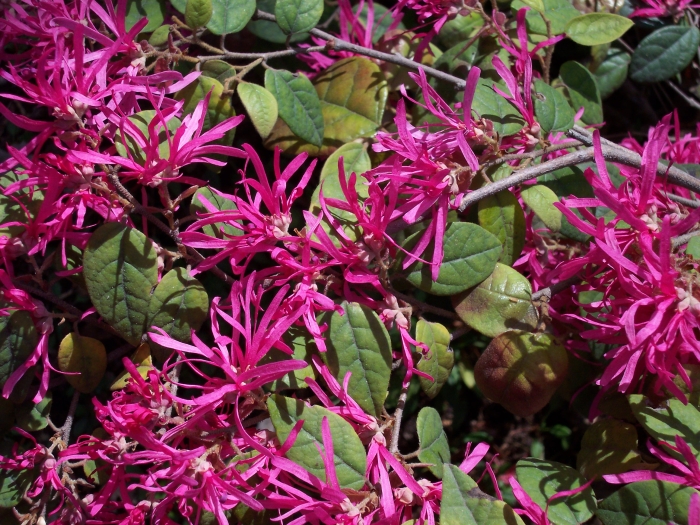Loropetalum
(Loropetalum chinense)
Loropetalum (Loropetalum chinense)
/
/

A. Barra
CC BY-SA 3.0
Image By:
A. Barra
Recorded By:
Copyright:
CC BY-SA 3.0
Copyright Notice:
Photo by: A. Barra | License Type: CC BY-SA 3.0 | License URL: http://creativecommons.org/licenses/by-sa/3.0/ | Uploader: Cillas | Publisher: Wikimedia Commons | Title: Loropetalum_chinense_Ming_Dinasty_ABL.jpg | Notes: {{Information |Description ={{en|1=Location taken: The United States National Arboretum, Washington DC. Names: Viburnum dentatum var. venosum Britt. Gleason, Arrow Wood, Arrow-Wood Viburnum, Arrowwood, Arrowwood Viburnum, Kalina zubat... |













































Estimated Native Range
Summary
Loropetalum chinense, commonly known as loropetalum, Chinese fringe flower, or strap flower, is an evergreen shrub native to the forest margins, open woodlands, and riverbanks of Southeast Asia, including regions in China, Japan, and the Himalayas. It typically grows to a height of 6-10 feet (1.8-3 meters) and a similar width, with a mounded, spreading form. The white- to pale-yellow-flowering variety has green leaves, while the pink-flowering variety features leaves that can range from bronze-red when new to olive-green or burgundy when mature, depending on the cultivar and growing conditions. The flowers are showy, with narrow, strap-like petals, blooming in spring and sporadically throughout the year.
Loropetalum chinense is valued for its vibrant foliage and abundant, fringe-like flowers that add a splash of color to the landscape. It is commonly used for foundation plantings, hedges, and as a colorful accent in mixed borders. This shrub prefers fertile, slightly acidic soil and benefits from mulching to maintain soil moisture. While it is hardy down to -15 degrees Celsius (5 degrees Fahrenheit), it thrives in full sun to part shade and requires well-drained soil to prevent root rot. Some cultivars, such as ’Ruby’ and ’Fire Dance’, are particularly noted for their compact habit and deep foliage color. Potential problems include root rot in poorly drained soils and occasional infestations of scale insects or sooty mold.CC BY-SA 4.0
Loropetalum chinense is valued for its vibrant foliage and abundant, fringe-like flowers that add a splash of color to the landscape. It is commonly used for foundation plantings, hedges, and as a colorful accent in mixed borders. This shrub prefers fertile, slightly acidic soil and benefits from mulching to maintain soil moisture. While it is hardy down to -15 degrees Celsius (5 degrees Fahrenheit), it thrives in full sun to part shade and requires well-drained soil to prevent root rot. Some cultivars, such as ’Ruby’ and ’Fire Dance’, are particularly noted for their compact habit and deep foliage color. Potential problems include root rot in poorly drained soils and occasional infestations of scale insects or sooty mold.CC BY-SA 4.0
Plant Description
- Plant Type: Shrub
- Height: 6-10 feet
- Width: 6-10 feet
- Growth Rate: Slow
- Flower Color: Pink, Purple, Red, White
- Flowering Season: Spring, Summer, Fall
- Leaf Retention: Evergreen
Growth Requirements
- Sun: Full Sun, Part Shade
- Water: Medium
- Drainage: Fast, Medium, Slow
Common Uses
Border Plant, Deer Resistant, Fragrant, Hedges, Low Maintenance, Potted Plant, Salt Tolerant, Showy Flowers, Street Planting
Natural Habitat
Forest margins, open woodlands, and riverbanks
Other Names
Common Names: Chinese Fringe-Flower , Strap Flower , Reimenblüte , Ji Mu
Scientific Names: Loropetalum chinense , Loropetalum chinense f. rubrum , Loropetalum subcapitatum , Hamamelis chinensis , Loropetalum chinense var. chinense , Loropetalum indicum , Tetrathyrium simaoense
GBIF Accepted Name: Loropetalum chinense (R.Br.) Oliv.